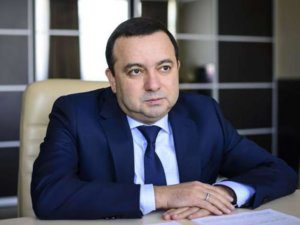
The Cabinet of Ministers has dismissed Oleksiy Kudriavtsev from his post of the head of the State Architecture and Construction Inspection of Ukraine. “Kudriavtsev has been fired,” Oleksandr Sayenko, minister of the Cabinet of Ministers, told the Kyiv-based Interfax-Ukraine news agency on December 12. He said Kudriavtsev had been dismissed because of violating his oath as a state servant.

DTEK has signed an agreement with the Danish manufacturer of wind turbines Vestas for building Orlivka wind power station (Prymorsky district, Zaporizhia region).
“The volume of investment in the project is about EUR140 million. We expect that the project will be completed by the end of 2019,” Maksym Tymchenko, DTEK’s director general, said during the signing of the contract.
The project, which envisages the construction of 26 wind turbines with a capacity of 3.8 MW each, is currently at the stage of completion of preparatory work. The main part of the construction work will begin in January 2019.
The capacity of the wind farm, which is the third project of the company in wind power, will provide electricity to about 200,000 households.
“We continue to implement our plans to increase the portfolio to 1,000 MW by the end of 2019, the total investment in these projects will exceed EUR 1 billion,” he said.

National Energy Company Ukrenergo has announced the launch of test transaction on the sale and purchase of electricity on the balancing market and the auxiliary service market from December 11, 2018 in line with the terms outlined in the law on the electricity market.
“Please look: exactly on the day stipulated by law, we launched a platform to simulate trading on the balancing market in real time, a period of 15 minutes. Everything is real, only without payments among market players,” Ukrenergo CEO Vsevolod Kovalchuk said, commenting on this event on his page in the Facebook social network.
Ukrenergo said that the first training module was attended by more than 40 representatives of power generation companies, including the largest Ukrainian electricity producers: National Nuclear Generating Company Energoatom, DTEK Energo, Centrenergo, Ukrhydroenergo and Donbasenergo.
The company said in a press release that market players familiarized themselves with the principles of the test platform, the algorithms of operations in the balancing market and the market of auxiliary services in real time, the mechanisms of communication and interaction between market players and the system operator and other things.
“All potential players of the balancing market and the market of auxiliary services will receive logins and passwords (keys) for access to the test platform and will be able to independently test it. After that, we will meet with market players to discuss issues related to the operation of the test platform,” Ukrenergo Deputy Director for Market Development and IT Andriy Nemyrovsky said.
Kovalchuk called information manipulation the objections in his posting that the presented platform is a “dummy,” and not a real system in which the bidding will be carried out.
Nemyrovsky responded to criticism by publishing part of the results of test operations, according to which the price of the balancing market in the period from 18:00 on December 11 to 14:00 on December 12 fell to UAH 900 per 1 MWh and rose to UAH 2,140 per 1 MWh. However, it was mainly UAH 1,400–1,500 per 1 MWh with the wholesale market price approved by the National Commission for the State Regulation of Energy, Housing and Utilities Services (NCER) for the second – fourth quarter being UAH 1,586.69 per MWh.

AB InBev Efes, a large brewing company, has brought a first batch of U.S. craft beer of Goose Island Brewery to Ukraine.
“The company brought to the Ukrainian market world-famous American brands from the manufacturer of craft beer Goose Island Brewery: Goose IPA and URBAN WHEAT ALE. The first batch is 60 hectoliters,” the company said in a press release on Tuesday.
Two brands of Goose Island Brewery are already on shelves in the Ukrainian MegaMarket, Novus and Silpo retail networks.
As reported, the world’s largest brewing concern Anheuser-Busch InBev (AB InBev) and Anadolu Efes, the largest brewing company in Turkey, completed the merger of businesses in Russia and Ukraine in equal shares late March 2018.
AB InBev Efes is one of the leaders of the Ukrainian brewing market, occupying 30.5% of it.
AB InBev Efes in Ukraine owns three breweries in Chernihiv, Kharkiv and Mykolaiv regions.